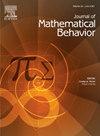理解驳斥文本对职前教师数学相关信念的作用
IF 1.7
Q3 EDUCATION & EDUCATIONAL RESEARCH
引用次数: 0
摘要
研究人员一致认为,关注教师的信念对于任何有效的教学改革都是至关重要的。然而,考虑到信念改变努力的好坏参半的结果,什么方法会引发信念改变的问题仍然存在。有一种方法在其他学科的信仰和观念改变中被证明是有效的,但很少在数学教育中使用,那就是使用反驳文本。我们调查了反驳文本对13名加纳职前教师数学相关信念的影响。此外,我们通过应用知识修正组件(Knowledge Revision Components, KReC)框架,探讨了反驳文本可能引发信念变化的潜在过程。我们观察到,职前教师在参与反驳文本后的反思与文本的内容表现出更大的一致性。KReC框架提供了对信念变化背后的过程的洞察。讨论了教师发展的意义,并对未来的研究提出了建议。本文章由计算机程序翻译,如有差异,请以英文原文为准。
Understanding the role of refutation texts on pre-service teachers’ mathematics-related beliefs
Researchers converge around the idea that attending to teachers’ beliefs is essential for any instructional reform effort to be effective. However, given the mixed results of belief change efforts, questions remain about what approaches will trigger belief change. One approach that has been shown to be effective in belief and conceptual change in other disciplines, but seldom used in mathematics education, is the use of refutation texts. We investigated the influence of refutation texts on 13 Ghanaian pre-service teachers’ mathematics-related beliefs. Further, we explored the underlying process by which refutation texts may have elicited belief change by applying the Knowledge Revision Components (KReC) Framework. We observed that pre-service teachers’ reflections after engaging with the refutation texts showed a greater alignment with the content of the texts. The KReC framework provided insight into the processes underlying this belief change. Implications for teacher development are discussed along with suggestions for future research.
求助全文
通过发布文献求助,成功后即可免费获取论文全文。
去求助
来源期刊

Journal of Mathematical Behavior
EDUCATION & EDUCATIONAL RESEARCH-
CiteScore
2.70
自引率
17.60%
发文量
69
期刊介绍:
The Journal of Mathematical Behavior solicits original research on the learning and teaching of mathematics. We are interested especially in basic research, research that aims to clarify, in detail and depth, how mathematical ideas develop in learners. Over three decades, our experience confirms a founding premise of this journal: that mathematical thinking, hence mathematics learning as a social enterprise, is special. It is special because mathematics is special, both logically and psychologically. Logically, through the way that mathematical ideas and methods have been built, refined and organized for centuries across a range of cultures; and psychologically, through the variety of ways people today, in many walks of life, make sense of mathematics, develop it, make it their own.
 求助内容:
求助内容: 应助结果提醒方式:
应助结果提醒方式:


